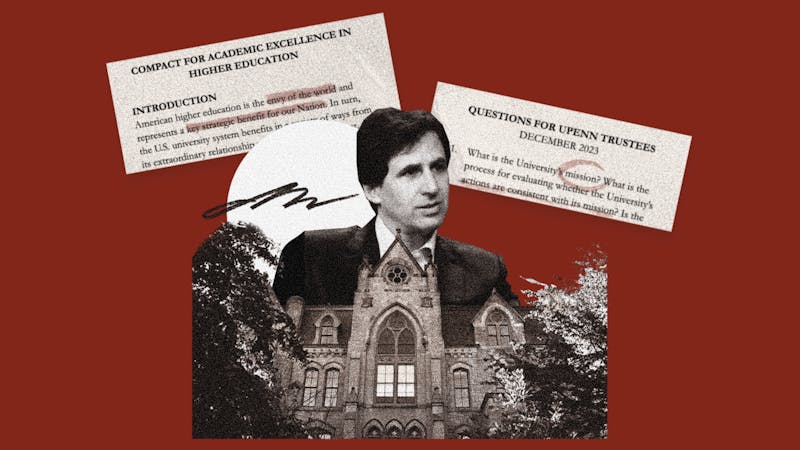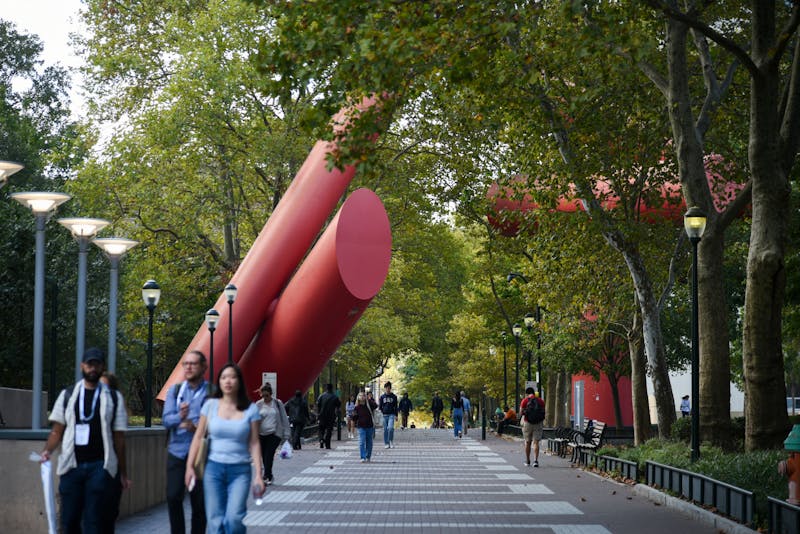Monday's release of the University's new strategic plan, dubbed Building on Excellence: The Next Agenda, sets out Penn's goals for the coming five years.
Like its predecessor, the original Agenda for Excellence, the new plan sets out a number of broad goals without going into great detail about how those goals will be accomplished, as is to be expected.
And there is little, if anything, to dislike in the plan. But though it may be hard to argue with such admirable goals, it is possible to judge their relative importance.
And so in light of the University's request for comment, we offer our thoughts.
Without question, one of the most important goals laid out in the new Agenda is to "build and retain an outstanding faculty." In this area, the University has done an admirable job over that last few years. One need only look at the Political Science Department's turnaround, thanks to a series of important new hires, for evidence.
It is also pleasing to see the University express its commitment to greater faculty diversity in the plan.
Ensuring excellence requires a vast investment of capital, and that is true for every goal in the new plan. Attracting and retaining a strong faculty, particularly through improved compensation packages, must be one of the University's highest priorities.
The second major issue presented by the new Agenda that we recommend the University focus on is the "integration" of the 12 schools, particularly the creation of more opportunities for interdisciplinary work in the four undergraduate schools.
Those students and faculty members who wish to utilize the resources of schools other than their own should be given that chance -- breaking down these barriers will not only create greater educational opportunity, but can serve as an additional carrot in luring the best students and faculty.
While opening opportunities and the creation of new, cross-school majors and programs is important, it is also important that the University tread carefully on the issue.
Eliminating administrative and budgeting impediments is important, but changes must not sacrifice the unique nature of each school at Penn.
The University's stated goal of attracting more minority and international students is a laudable one. We encourage administrators to pay particular attention to this goal and ensure that it comes to fruition, especially in improving the retention rate for minority students.
Among the five areas of strength the University identifies as crucial to build upon, one stands out in particular -- urbanism and urban studies.
Penn's location offers virtually limitless opportunity to improve its offerings and scholarship in the field of urban studies. More money and attention are needed for the Urban Studies Program and the new Agenda's plan to create a more centralized research division should be implemented as soon as possible.
Penn must also put a greater focus on its efforts to build the humanities and social sciences than is evident in the new Agenda. Penn must work to improve the areas it has already laid out, but it cannot forget the bread and butter of its largest undergraduate school.
Finally, implicit in building excellence is building capital.
Penn needs a larger endowment and a great deal of extra cash if the strategic plan is to be successful. University President Judith Rodin has proven very astute in terms of fundraising -- now is the time for her to redouble her efforts.
That said, there are a few troubling areas in the Agenda.
Most troubling of these is the Agenda's words about the University's relationship with the surrounding West Philadelphia community.
It is important for Penn to remember -- something that often seems lost in the language of the new Agenda -- that West Philadelphia is not its laboratory. It is a real community made up of real people who have as much right to be a part of this community as the University does.
In dealing with University City and the surrounding neighborhoods, Penn must ensure that it honors existing agreements -- most importantly the one that promises no further expansion west of 40th Street -- and build community trust.
This is not to say that the University should have nothing to do with West Philadelphia -- many of its recent initiatives, most notably the Penn-assisted public school, have been admirable and quite neighborly. But Penn must be very careful in dealing with community members.
There is also a disturbing lack of emphasis on financial aid. If Penn is to remain competetive with its peer institutions, it absolutely must do more in expanding financial assistance to needy students. It is disappointing that this was not deemed important enough for greater mention.
The first Agenda for Excellence laid the blueprint for many of the University's successes over the past five years, achieving most of its goals.
We hope that this new Agenda proves as succesful as the first.
The Daily Pennsylvanian is an independent, student-run newspaper. Please consider making a donation to support the coverage that shapes the University. Your generosity ensures a future of strong journalism at Penn.
DonatePlease note All comments are eligible for publication in The Daily Pennsylvanian.







